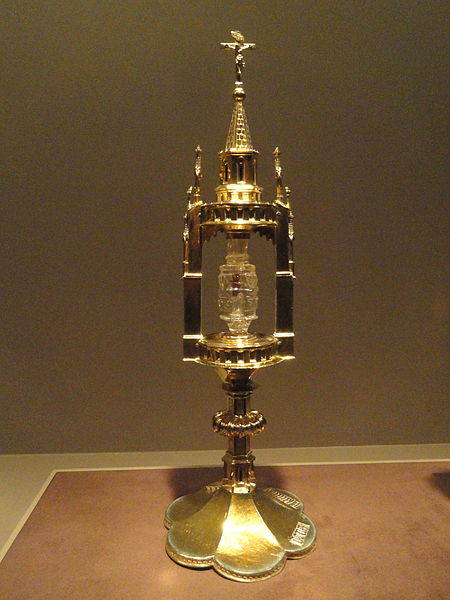I recently tackled the public discussion in Germany about whether to rename the Stiftung Preussischer Kulturbesitz, the foundation that oversees the State Museums of Berlin and some of the most remarkable collections in the world. Readers of the Art Law Report will know this name well, the SPK is the defendant in the lawsuit brought by my clients for the restitution of the Welfenschatz, or Guelphe Treasure, that the Supreme Court heard in 2020. While I've never been shy about criticizing the SPK about its approach in our our case (which is on appeal, briefs here and here), this piece addresses a different question. Namely, what place does the name "Prussia" have in the 21st century? For anyone like me who still thinks about the historical sliding doors of the Grossdeutschelösung and Kleindeutschelösungdebate of the 19th century about how to unite the German-speaking states and duchies, this piece is for you.
Read More
Topics:
Holy Roman Empire,
Prussia,
"Elephant Mural",
Martin Luther,
Stiftung Preussischer Kulturbesitz,
Sueddeutsche Zeitung,
Hermann Goering,
Der Spiegel,
Prussian Cultural Heritage Foundation,
Andy Warhol,
Welfenschatz,
Humboldt Forum,
C. Montgomery Burns,
Claudia Roth,
Siam,
Sigismund of Luxembourg,
Friedrich VI,
Hohenzollern,
Brandenburg,
Kaliningrad,
Augustus II the Strong,
Nefertiti,
Pergamon Altar,
Annalena Bärbock,
Monika Grütters,
Götz Aly,
Joseph Beuys,
Königsberg,
Nazism,
Konrad Adenauer,
Hermann Parzinger,
Luf Boat,
Bild
(WASHINGTON-October 22, 2020) The heirs to the Jewish art dealers who were forced to sell the medieval devotional art collection known as the Welfenschatz (in English, the Guelph Treasure) to agents of Hermann Goering in 1935 filed their brief today in the Supreme Court of the United States. It can be viewed at this link. The Supreme Court is set to hear argument on December 7, 2020, on whether the Foreign Sovereign Immunities Act (FSIA) and its “takings clause” create jurisdiction over the heirs’ claims for restitution of the Welfenschatz—as all reviewing courts so far have held. The Welfenschatz is held by the Stiftung Preussischer Kulturbesitz (in English, the Prussian Cultural Heritage Foundation).
Read More
Topics:
Third Reich,
Gestapo,
Z.M. Hackenbroch,
Prussia,
Germany,
Nazi-looted art,
Foreign Sovereign Immunities Act,
Markus Stoetzel,
Supreme Court,
Mel Urbach,
SPK,
Nuremberg race laws,
Stiftung Preussischer Kulturbesitz,
Hermann Goering,
FSIA,
NS Raubkunst,
Sullivan & Worcester LLP,
J.S. Goldschmidt,
Gerald Stiebel,
Prussian Cultural Heritage Foundation,
Adolf Hitler,
Nicholas M. O'Donnell,
Alan Philipp,
Welfenschatz,
I. Rosenbaum,
Paul Körner,
Wannsee Conference,
Jed Leiber,
House of Brunswick (Braunschweig)-Lüneberg,
Emily Haber,
Wilhelm Stuckart,
Final Solution
(WASHINGTON-July 2, 2020) The United States Supreme Court today agreed to hear the appeal by Germany and the Stiftung Preussischer Kulturbesitz (SPK) seeking to dismiss the restitution claim by the heirs to the so-called Guelph Treasure (known in German as the Welfenschatz). The claims arise out of the forced transfer in 1935 of the Guelph Treasure by a consortium of Jewish art dealers to agents of Hermann Goering, who personally presented it as a gift to Hitler. In 2018, the Court of Appeals for the D.C. Circuit held that U.S. courts have jurisdiction over the claim under the Foreign Sovereign Immunities Act of 1976 (FSIA). That appellate court had rejected the Defendants’ arguments that U.S. courts lack jurisdiction, and that Germany’s treatment of its Jews in the 1930s should be immune from judicial scrutiny.
Sullivan partner Nicholas M. O’Donnell said, “we are grateful for the opportunity to address the Supreme Court on these important questions about holding Germany accountable for its Nazi-looted art. A 1935 transfer from German Jews to notorious art looter and war criminal Hermann Goering is the quintessential crime against international law, regardless of Germany’s Holocaust distortion in defending this case. Germany seeks to eliminate recourse for Nazi-looted art and the Court will have the chance to answer this question of critical importance for Holocaust victims.” O’Donnell added, “this is also an opportunity to rebuke the Department of Justice and State Department, who turned their back on decades of U.S. policy by siding with Germany’s effort to keep Nazi-looted art.”
Read More
Topics:
United States Supreme Court,
Nazi-looted art,
Department of Justice,
SPK,
Stiftung Preussischer Kulturbesitz,
Hermann Goering,
NS Raubkunst,
Gerald Stiebel,
Prussian Cultural Heritage Foundation,
Federal Republic of Germany,
Alan Philipp,
Welfenschatz,
State Department,
Paul Körner,
Jed Leiber
The Stiftung Preussischer Kulturbesitz (Prussian Cultural Heritage Foundation, or SPK) in Berlin announced that it had agreed to restitute a 1537 painting of the biblical figure Lot by Hans Baldung Grien to the heirs of Hans Purrmann, a German painter persecuted as a “degenerate” artist in the infamous Nazi action of the same name. Purrmann sold the Grien painting in 1937.
Read More
Topics:
Berlin,
Expressionist,
Hildebrand Gurlitt,
Nazi-looted art,
Max Beckmann,
Karl Buchholz,
SPK,
Stiftung Preussischer Kulturbesitz,
Hermann Goering,
Kirchner,
Degenerate Art Action,
Prussian Cultural Heritage Foundation,
Raubkunst,
Welfenschatz,
Hans Purrmann,
Neue Sachlichkeit,
Freund,
Han Baldung Grien,
Ferdinand Möller,
Bernhard Böhmer,
New Objectivity,
Grosz
The U.S. Court of Appeals for the D.C. Circuit today dismissed the petition to rehear en banc last year’s landmark ruling that the heirs of the art dealers who sold the Guelph Treasure (or Welfenschatz) may pursue their claims in U.S. federal court. Defendants the Federal Republic of Germany and the Stiftung Preussischer Kulturbesitz (the SPK, or Prussian Cultural Heritage Foundation in English) had argued that claims under the Foreign Sovereign Immunities Act’s expropriation exception such as these are not violations of international law and also require a claimant to exhaust remedies abroad, a position rejected by prior decisions of the D.C. Circuit and by today’s ruling as well.
Today’s decision confirms the first-of-its kind holding last year that a German state museum must face claims based on allegations of Nazi-looted art, a direct result of Germany’s failures through its so-called Advisory (often called Limbach) Commission to address seriously and comprehensively the state of Nazi-looted art in its national collections. In the five years since denying the Guelph Treasure claimants any meaningful attention, Germany has fumbled through the Gurlitt fiasco and attempted other various distractions like its new fitful attention to colonial art (with no real progress there either). Germany has repeatedly disparaged my clients by suggesting that the matter was already "decided on the merits" before Germany's Advisory Commission. This is false. The Advisory Commission renders non-binding recommendations to state museums and has been roundly criticized for its opinions in 2014 and 2015 in particular, when my clients were denied justice. There is no small irony in having to explain this in the context of Germany's request for a do-over after last year's ruling.
Read More
Topics:
Third Reich,
Feist,
Prussia,
Germany,
Nazi-looted art,
Foreign Sovereign Immunities Act,
SPK,
Advisory Commission,
Stiftung Preussischer Kulturbesitz,
Hermann Goering,
expropriation exception”,
Nazi persecution,
Boy Leading a Horse,
NS Raubkunst,
J.S. Goldschmidt,
Prussian Cultural Heritage Foundation,
forced sale,
Zacharias Hackenbroch,
Welfenschatz,
I. Rosenbaum,
Holocaust Expropriated Art Recovery Act,
HEAR Act,
Paul Körner,
Staatliche Museen zu Berlin,
Kunstgewerbemuseum
Quite by coincidence, two stories we have covered in the last few days have centered around the claims by the heirs of Paul von Mendelssohn Bartholdy, a Jewish banker and art collector who was the target of Nazi persecution before he died in 1935: Julius Schoeps, Edelgard von Lavergne-Peguilhen, and Florence Kesselstatt. Another common thread has been the Bavarian State Paintings Collection (the Bayerische Staatsgemäldesammlung), which is in the news again for possible claims, but this time from heirs of quite a different sort.
Read More
Topics:
Paul von Mendelssohn Bartholdy,
Fritz Bamberger,
Focus,
Florence Kesselstatt,
Karl Blechen,
Karl Ernst Baumann,
Julius Schoeps,
Dr Alexander Lewin,
Germany,
Anselm Feuerbach,
Hans Sachs,
German Advisory Commission for the Return of Cultu,
Gurlitt case,
Edelgard von Lavergne-Peguilhen,
Julius and Clara Freund,
Eva Braun,
Nürnberger Institut,
Johann J. August von der Embde,
Stiftung Preussischer Kulturbesitz,
'Stürmer-Bibliothek',
Wilhelm Leibl,
Jim Tobias,
Portrait der Familie von Dithfurth,
Restitution,
Bavarian State Paintings Collection,
Bayerische Staatsgemäldesammlung,
Der Spiegel,
World War II,
Peasant Girl without a Hat and with a White Headcl,
Pinakothek der Moderne,
Prussian Cultural Heritage Foundation,
Austria,
Andrea Bambi Mountain Landscape on the Spanish Coa,
Jutta Limbach,
Washington Principles,
Der Stürmer,
Welfenschatz,
Limbach Commission
One of the issues exposed and exacerbated by the ongoing Gurlitt collection stalemate is the question of Germany’s restitution procedures with respect to art. As the Bavarian legislative proposal to abolish the statute of limitations for claims against bad-faith acquirers is considered by the Bundestag, the “German Advisory Commission for the Return of Cultural Property Seized as a Result of Nazi Persecution, Especially Jewish Property” has issued a decision over what has become known as the “Guelph Treasure” (Welfenschatz) in the collection of the Stiftung Preussischer Kulturbesitz (SPK), the Prussian Cultural Heritage Foundation. The March 20, 2014 opinion (available, so far as I know, only in German at this point at www.lostart.de) underscores the issues around claims of sales under duress, and the appropriate present-day procedural remedy. Readers should also brush up on their medieval German history to keep up.
Read More
Topics:
Holy Roman Emperor Otto IV,
German Supreme Commercial Court,
Holy Roman Empire,
Bundeshandelsgericht,
German Supreme Constitutional Court,
Z.M. Hackenbroch,
Karl Blechen,
Duchy of Brunswick and Lüneburg,
Niedersachsen,
Karl Ernst Baumann,
Act of State,
Kingdom of Hanover. Königreich Hannover,
Dr Alexander Lewin,
Prussia,
Lower Saxony,
Anselm Feuerbach,
Gurlitt Collection,
Foreign Sovereign Immunities Act,
Preussen,
Hans Sachs,
German Advisory Commission for the Return of Cultu,
Hessen,
Fogg Art Museum,
Congress of Vienna,
Julius and Clara Freund,
Kurhannover,
Dresdner Bank,
Hermann Goring,
Austrian Supreme Court,
Johann J. August von der Embde,
House of Welf,
Stiftung Preussischer Kulturbesitz,
Wilhelm Leibl,
Portrait of Amalie Zuckerkandl,
Braunschweig-Lüneburg,
Harvard,
Portrait der Familie von Dithfurth,
Gurlitt,
Restitution,
George I,
J.S. Goldschmidt,
World War II,
Peasant Girl without a Hat and with a White Headcl,
Queen Victoria,
Prussian Cultural Heritage Foundation,
Art Institute of Chicago,
Kurfürsten,
Jutta Limbach,
www.lostart.de,
Soviet Union,
Gustav Klimt,
Bundesverfassungsgericht,
Welfenschatz,
Limbach Commission,
I. Rosenbaum,
Electors




-1.jpg)




